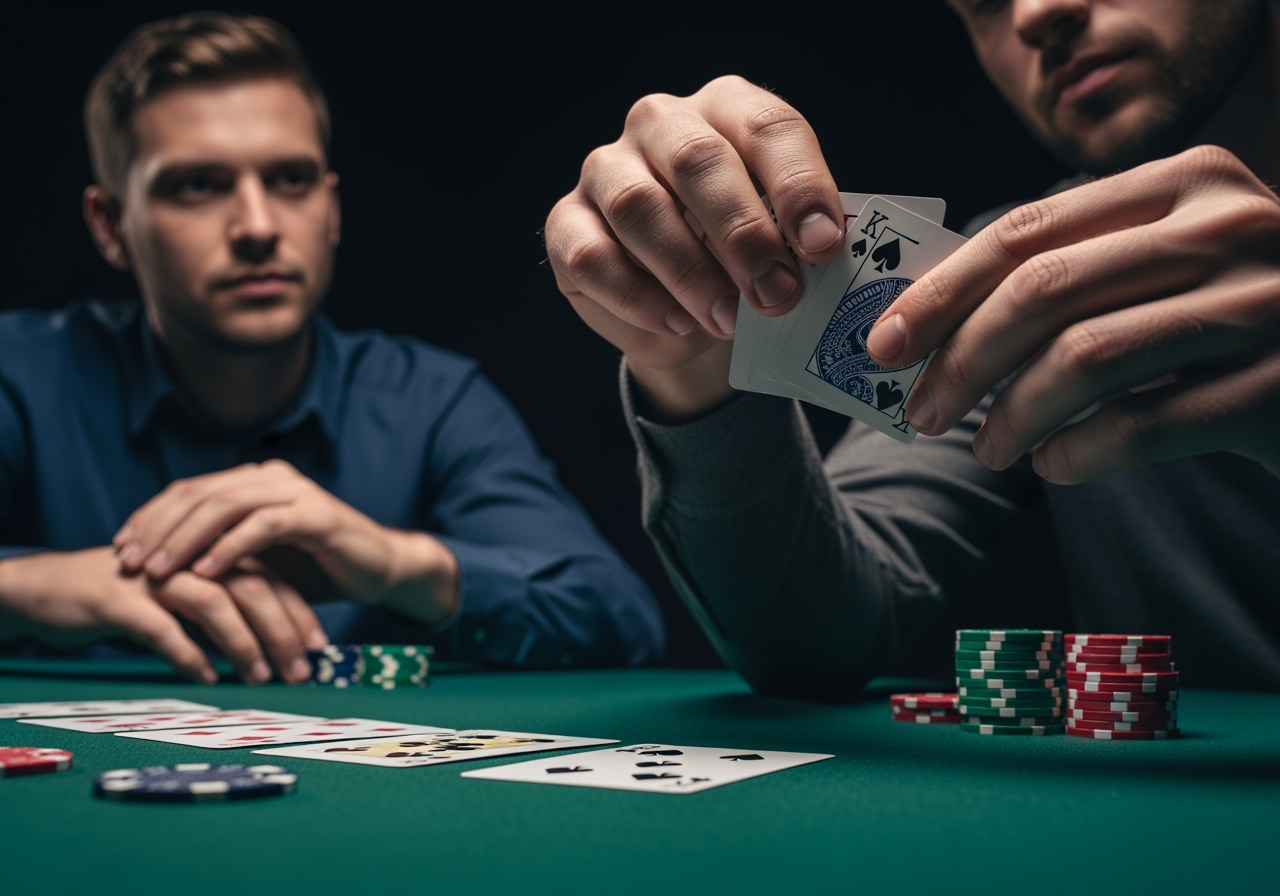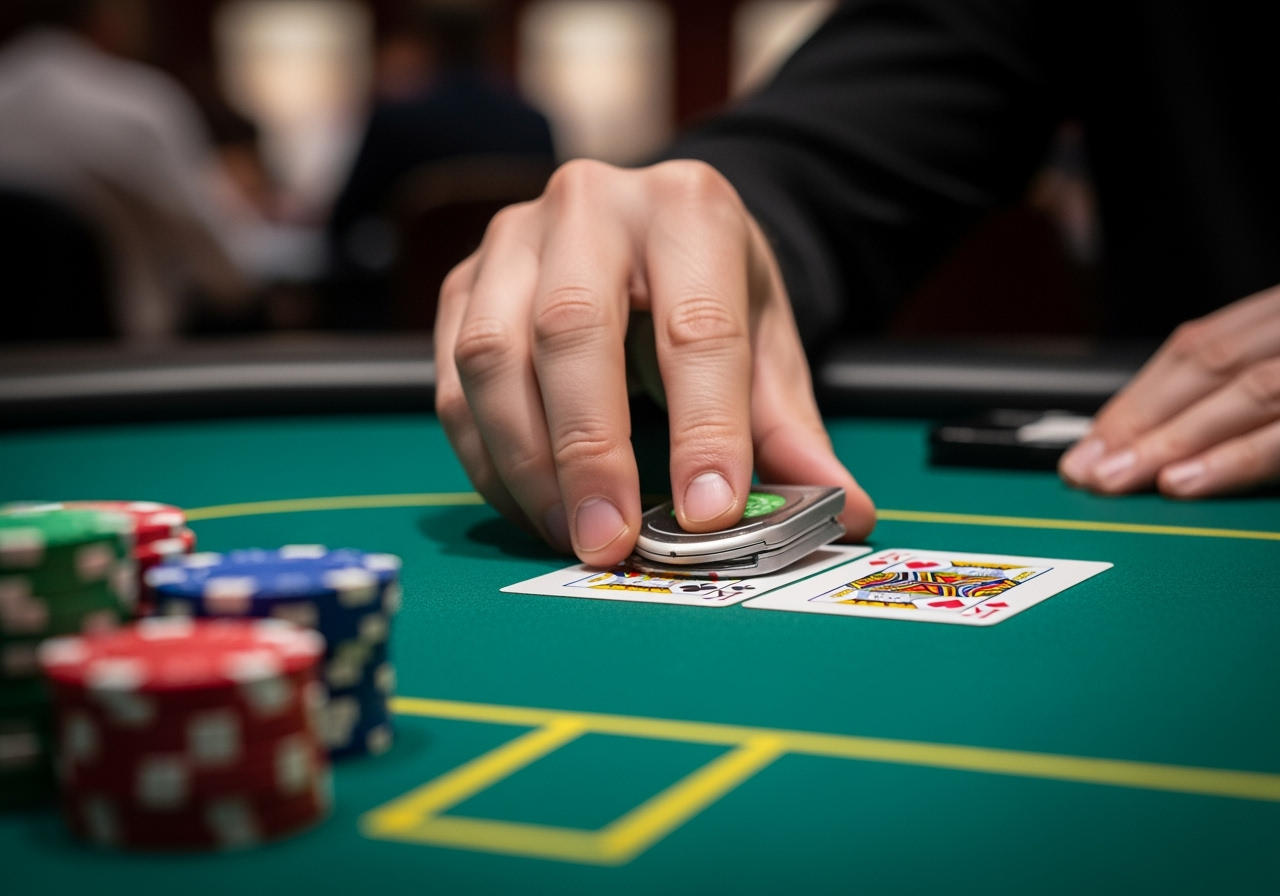Understanding the Slow Roll in Poker
Definition and Timing of a Slow Roll
So, what is a slow roll? It is the willful act of resting before showing a particular winning hand during showdown. The player spends his time in showing his cards and gives his enemy a false hope that he/she destroys in a moment. It is not a strategic move, this is a violation of the unwritten rules of poker that are meant to annoy or tilt the other player. This procrastination is the worst because of the evil mind attached to it and this act is detestable to the entire society.

The timing is critical. In poker, slow roll only happens when a player deliberately dawdles only when the game is on showdown, and all the bets have been made. To illustrate, in limit hold em or no-limit games whereby one of the opponents has already put his/her hand on the table before you possess the winner then you must do it immediately. A diplomatic stalling is bad manners. This is contrary to spending time to make a call during a betting round. New players usually mix these moments, as they consider them a violation of conduct instead of valid thinking.
Intent vs. Accident: Is It Truly a Slow Roll?
One does not mean that all delays on showdown are ill minded. It is not uncommon to find a harmless hesitation especially on a new player who might have misread his/her hand or the board. The other reasons may be language barrier in a foreign table or delay in connection during an online game. Such cases are deprived of the most important factor, and that is maliciousness; it is not a conscious violation of correct behavior, but an honest mistake.
The key difference is intent. A true slow roll in poker is a set up taunt which is meant to annoy some one. In order to measure this, it is possible to refer to the behavior of the player. Did they play the weak ones, did they act hesitatingly and then produced the nuts? It is this calculated decision to humiliate that makes up malicious slow rolling that is especially obvious in games such as limit hold em where the value of hands is more obvious. It is a good habit to verbally declare your very strong hand such as the nuts when you table it early so as to avoid ambiguity with your play.
Why Slow Rolling Is Considered Bad Etiquette
Psychological Impact and Table Atmosphere
The major effect of a slow roll is psychological. It is a straight insult which is intended to tilt an opponent and influence his emotions and further actions. It is a poor move of poker behavior that spoils the air at the table and makes a friendly game an aggressive one in a minute. When there is no trust, then the poker table etiquette is lost. Professionals all round the world condemn this move, and this move is termed as a grave violation of poker etiquette. The bad energy can take hours and it is experienced by every player.
The slow roll in a major tournament has made a player go crazy on TV before, which is a stark reminder of the amount of emotional damage it can do and why it is so harshly frowned upon in the community. One of the poker players late of 20s is seated on a poker table and his head is in his hands and he looks very frustrated and unbelieving. The opponent who has won the pot on the other side of the table is gradually showing the winning cards with a pompous face. The other players are observing uneasily because the mood is tense. The lighting is dramatic and it switched the emotional conflict of the two players.
Pros and Cons of Slow Rolling (Spoiler: Mostly Cons)
This is why the experienced ones do not use it because of the cost-benefit analysis of such a move. The sole positive that can be argued is that it is entertaining in the case of televised games and can be applied so as to generate suspense among the viewers. The downsides are serious in fact. It is a typical example of bad poker etiquette which instantly makes you look bad at the table. It annoys opponents, destroys table play and eventually, it costs you money. When you display a winning hand at showdown to the players in future pots, they will memorize these and will become less willing to pay you off in the future.
Warning: A slow roll in poker is a direct monetary implication. When you slow roll, the other players will stop giving you action and this is to say, you will end up winning smaller pots because they will stop trusting or respecting your game.
Real Examples of a Slow Roll at the Poker Table
Televised and Live Case Studies
The most infamous slow roll case was the World Series of Poker (2019) in which bad sportsmanship was witnessed. However, this scandalous roll in poker is not a monopoly in Las Vegas. This slow roll in which the one with the nuts takes a dramatic pause to reveal his hand has been viewed in the poker tournaments in Germany as well.
The reaction to such a slow rolling is almost unanimous, fellow players can be heard or seen to express disgust and the live audience and those who are watching online can be heard or seen to express their dislike. This behavior though leading to the creation of TV drama, it only destroys the reputation of a player as well as the game. One of the shots of a poker tournament on TV.
One of the players is grinning and he is turning over the winning set of poker cards so slowly that a lot of tension is created. The villain seated opposite the table is hit with a face of complete stupefaction and anger and the audience seated in the dim-lit fringes is stretching forward to know what is going to happen.
Notable Online Example and Community Reaction
The websites like twitch and YouTube on the internet have created unlimited bad poker etiquette. Perhaps the most notable was when a streamer deliberately made a slow roll in a high stakes cash game, which also led to an instant uproar of viewers. The criticisms were all over the live chat and after only 24 hours the ratio of the number of dislikes to the number of likes in the following video clip was 10 to 1. This kind of reaction indicates the good stand of the community.
One of the users of popular forums states that the rules are only a part of poker etiquette but respect is also a matter. Nothing there is like purposely taking your time in winning your hand at showdown to humiliate somebody and this is what ruins the game to everyone. The bad reviews can be taken as the digital age cautionary tale regarding the damaged reputation.
How Slow Rolling Differs from Bluffing or Trapping
Slow Roll vs. Slow Play vs. Trap – Key Differences
One should distinguish a slow roll in poker and strategic moves. Slow playing is a technique of under-betting a monster hand like a pair of aces with an aim of making a larger pot. Similarly, trapping is that of checking a big hand (a rivered full house), to get an opponent to bluff. These are two respectable features of poker strategy.
So, what is a slow roll in comparison with these? The differences are mainly in the timing and bad intent. This is a bad poker behavior which occurs when all the betting is complete. It is a calculated pause when flashing a winning hand, not a strategic move, but just to tease an opponent by giving him false hope. This is considered as a major infringement of table manners.
Comparison Table: Slow Roll vs. Slow Play vs. Trap
The following table gives the clear differences between tactics and unsporting behavior which are very important. Even though it is not bad to slow play and trap so as to maximize the value of the game in games like limit hold em, there is one thing that is not correct. The slow roll can be undertaken only during the show down when all the bets are made. It is just a way of poking a rival, so it is a sure indication of bad poker etiquette. This is the most necessary to understand how to act at the poker table and make the game worthy of all people.
| Tactic | Action | Intent | Timing | Perception | Acceptability |
|---|---|---|---|---|---|
| Slow Roll | Intentionally delays revealing a winning hand. | To taunt or disrespect the opponent. | Exclusively at showdown. | Disrespectful. | Universally condemned. |
| Slow Play | Plays a strong hand very passively. | To deceive opponents and build a pot. | During betting rounds. | Strategic. | Accepted tactic. |
| Trap | Induces a bet with a strong hand. | To extract maximum value. | During betting rounds. | Cunning. | Accepted tactic. |
What to Do If You’re Slow Rolled
Steps to Handle Being Slow Rolled Professionally
It is frustrating to be slow-rolled but a professional reaction saves your image and attention. First, take a deep breath in order to prevent the immediate emotional reaction; the slow roller does not want you to lean, so do not grant him that pleasure. The best thing to do is to muck your cards without any commotion and then change your focus on the next hand. The only thing that the focus on it does is to damage your game. The simple and quiet, Nice hand, will help you to avoid tension, in case you need to say something. The floor personnel should only be contacted in extreme circumstances when you feel that there is real angle shooting going on and this is influencing the pot.
Warnings: Emotional Reactions to Avoid
Caution: The last thing you need to do is to become emotional when someone makes a slow roll. It will turn an already bad situation into a much worse one. Do not verbally assault, call names or fling chips at the abuser. This kind of behaviour is a serious breach of behaviour and there are actual consequences. As an example, in the majority of the German casinos aggressive behaviour can lead to an immediate penalty, such as being kicked out of the game, or out of the casino. Once you realize that you are getting tilted because of the bad sportsmanship, then the best option is to take a short walk, breathe and bring yourself out of it.
Tips to Avoid Unintentional Slow Rolls
Practical Tips to Reveal Your Hand Promptly
You should never fold your winning hand and show it at the showdown immediately in order to remain on the right side of the poker table and not to be accused of a slow roll. When the betting action is finished turn your cards without any theatrical pause. One of the best habits in a game such as limit hold em is to announce your hand; nuts or full house, when you lay it on the table. This makes it clear and avoids misunderstanding and stalls in the game.

More so, a card protector can be used to avoid fumbling or time wastage during your turn to show. You must also put your winning hand face up always so that you can be considered as a respectful player.
Quick Etiquette Checklist for New Players
Several etiquette tips that are necessary to follow by the novice players in order to ensure the good dynamics at the table should be remembered. However, you should never be indecisive when it is your turn and make your cards up on the table. You must avoid discussing the hands that are still in play or you take time to demonstrate winning hand deliberately. Finally, never forget to listen to the dealer and be conscious of certain house rules, since they are the ultimate authority.
FAQ: Common Questions About Poker Etiquette and Slow Rolls
Frequently Asked Questions
Is slow rolling illegal? It is not against the rules of poker, but a massive infringement of etiquette. Are there penalties? Although you will not be disqualified, floor managers will be issuing warnings on bad behavior, especially in German casinos where respect is important. Is it online and not in the real life? Yes. A lag on the Internet could be a lag but at the poker table, in reality, it is a personal insult. This will ruin the mood on the table and your image in the eyes of your peers.
